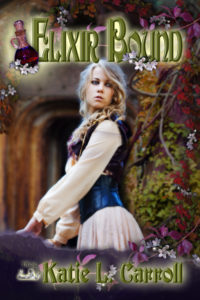 When I first found out I was expected to write my own blurb for ELIXIR BOUND, I was kind of terrified. The blurb is one of the most important selling tools of a book, probably only second to the cover. If a cover and title draw in a reader, chances are the next thing they’ll look at is the blurb in order to decide if they’re going to read the book.
When I first found out I was expected to write my own blurb for ELIXIR BOUND, I was kind of terrified. The blurb is one of the most important selling tools of a book, probably only second to the cover. If a cover and title draw in a reader, chances are the next thing they’ll look at is the blurb in order to decide if they’re going to read the book.
What exactly is a book blurb? It’s what some call jacket copy, and it’s the brief description of the story you find on the back or inner jacket of a print book and in the book’s listing online. Some big publishing companies will write the blurbs for their authors (though they may take phrases from the author’s or agent’s original pitch of the book), but small presses often look to authors to provide one. And in self-publishing, of course, it’s up to the author to write a blurb or hire someone to do it for them.
Here’s what I came up with for ELIXIR BOUND.
Katora Kase is next in line to take over as guardian to a secret and powerful healing Elixir. Now she must journey into the wilds of Faway Forest to find the ingredient that gives the Elixir its potency. Even though she has her sister and brother, an old family friend, and the handsome son of a mapmaker as companions, she feels alone. It is her decision alone whether or not to bind herself to the Elixir to serve and protect it until it chooses a new guardian. The forest hosts many dangers, including wicked beings that will stop at nothing to gain power, but the biggest danger Katora may face is whether or not to open up her heart to love.”
I have actually started writing blurbs for stories as part of my drafting process. Sometimes I do this right at the beginning of the first draft and other times I’ll use the blurb writing as a tool to get me unstuck when I reach a tricky part of the drafting process that has me stalled.
I don’t generally outline a story before I write it (I’m what’s referred to as a panster vs. a plotter, who will outline the entire story before starting to write it), though I do usually know what the end point of the plot will be and at least some of the main plot points along the way (I do this all in my head in the beginning). I’ve found the blurb is a good tool to help me shape the story as I move along with it, and it also serves as a good reminder of what my original intentions were.
A blurb is not as rigid or detailed as an outline, so there’s plenty of room to move and change the story. It generally doesn’t take too long for me to whip up a blurb these days, so it’s not something that requires a huge time investment. That way I don’t feel like I’ve wasted time if I end up throwing the whole blurb out at the end and starting over once the draft is finished. As opposed to having a whole outline already written out and then having the book take an unexpected turn and having to rethink the entire 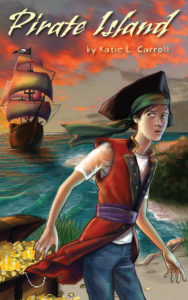 outline. (I’m not disparaging plotters…I think we all work in the best way we can and every writer needs to do what works for them.)
outline. (I’m not disparaging plotters…I think we all work in the best way we can and every writer needs to do what works for them.)
Since writing that first blurb for ELIXIR BOUND, I’ve had a lot more practice with them, both for my own stories and as an editor for other writers’ stories. If I could do it all over again, I’d probably make some changes to the ELIXIR BOUND blurb, but it’s sufficient enough to leave as is…for now anyway!
Recently I revealed the cover and blurb for PIRATE ISLAND. I decided to do a tagline teaser at the beginning before launching into the summary part of the blurb. One difference between writing a blurb for a YA or adult book vs. one for a middle grade book is that many middle grade books are bought by parents for their kids, whereas YA and adult books are primarily bought by the person who is going to read it. So that’s an extra layer of audience that needs to be kept in mind. I’m hoping young readers and their parents will be drawn in to the story based on what I came up with for PIRATE ISLAND:
A thrice cursed island, a legendary pirate treasure, and one not-so-brave boy. What could possibly go wrong?
For centuries, the whereabouts of Captain William Kidd’s lost pirate treasure has remained a mystery. When Billy’s best friend, Andy, proposes they look for it on nearby Pirate Island, Billy thinks it’s just another one of their crazy adventures. It’s usually Billy who ends up in trouble as a result, but he goes along for the ride…like always. The more he delves into the life and death of Kidd, the more he thinks the treasure is real and that it might be buried on the small island in Long Island Sound. Billy—nope, call him William—becomes obsessed with the captain of the same first name. He even believes he’s possessed by Kidd’s restless soul. Now he and the spirit of a long-dead pirate are leading the crazy adventure on Pirate Island. And what they find is far bigger than the treasure they imagined.”
A lot of blurb writing is about finding the right balance between giving enough specifics to entice a reader in while also not giving away too much of story to spoil it. You also want to make the writing interesting and not read like a plot summary (because that’s boring). It’s tempting to be all movie trailer dramatic in a blurb and be too generic. I find phrases like “must save the world” or “will the star-crossed lovers ever be together?” to be far less effective than something more specific to the actual story. Hooky sound-bites are great, so long as they offer something unique to the story.
What kinds of blurbs have your read that made you just have to pick up a book?
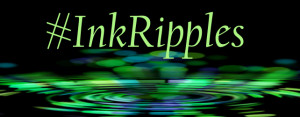
#InkRipples is a monthly meme created by Katie L. Carroll, Mary Waibel, and Kai Strand. We pick a topic (June is all about book blurbs), drop a ripple in the inkwell (i.e. write about it on our blogs), and see where the conversation goes. We’d love to have you join in the conversation on your own blogs or on your social media page. Full details and each month’s topic can be found on my #InkRipples page.
 A thrice cursed island, a legendary pirate treasure, and one not-so-brave boy. What could possibly go wrong?
A thrice cursed island, a legendary pirate treasure, and one not-so-brave boy. What could possibly go wrong?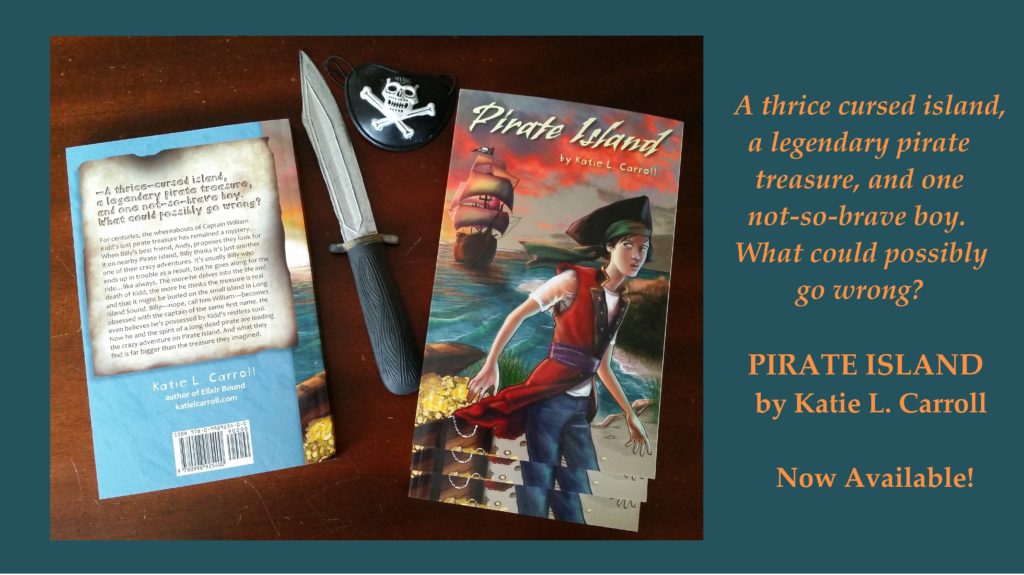
 When it comes to publishing a book, there are so many more options than there used to be. If you’re new to the business, it can be downright overwhelming and confusing to decide what publishing path is the right one for you. That is why we decided to tackle the topic in this month’s
When it comes to publishing a book, there are so many more options than there used to be. If you’re new to the business, it can be downright overwhelming and confusing to decide what publishing path is the right one for you. That is why we decided to tackle the topic in this month’s 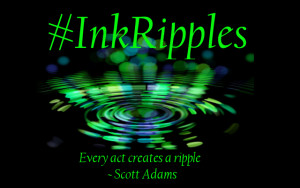
 I’ve been feeling particularly unproductive this year, in part because I haven’t been doing much drafting. It’s my favorite part of the writing process and the one that creatively feels the most fulfilling. I feel whole when I’m in the midst of a draft and able to lose myself in the process of adding words to the page.
I’ve been feeling particularly unproductive this year, in part because I haven’t been doing much drafting. It’s my favorite part of the writing process and the one that creatively feels the most fulfilling. I feel whole when I’m in the midst of a draft and able to lose myself in the process of adding words to the page.





















